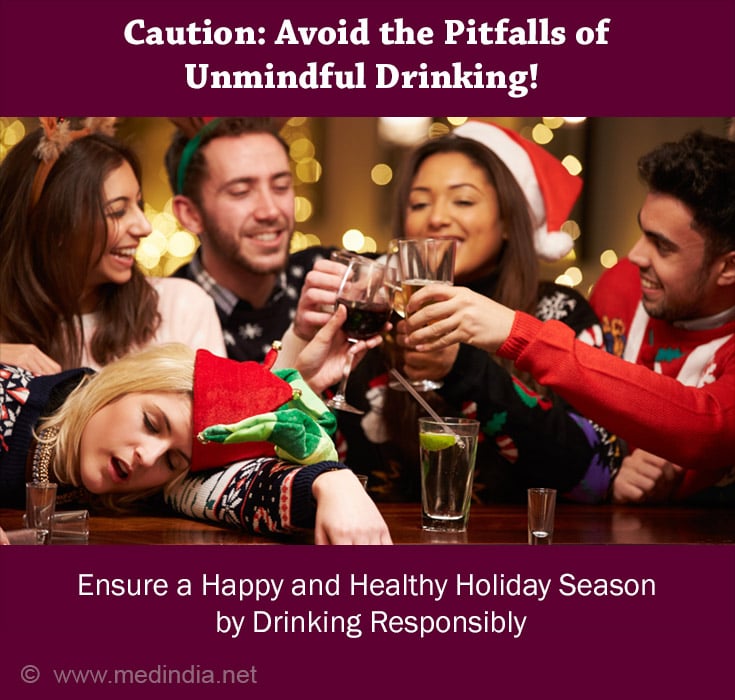- How to think about your drink: Action-identification and the relation between mindfulness and dyscontrolled drinking - (https://pubmed.ncbi.nlm.nih.gov/26812278/)
- Mechanism of Dehydration Following Alcohol Ingestion - (https://jamanetwork.com/journals/jamainternalmedicine/article-abstract/568848)
- Dietary influences on alcohol intake: a review - (https://pubmed.ncbi.nlm.nih.gov/9498312/)
- Alcohol and Human Health: What Is the Evidence? - (https://pubmed.ncbi.nlm.nih.gov/32209032/)
About
The holiday season is about celebratory gatherings, filled with the clinking of glasses and the aroma of festive cheer. While alcohol is often synonymous with celebration, it can present challenges for those seeking to maintain a healthy relationship with drinking. Peer pressure, emotional complexities, and societal expectations make mindful drinking essential. Here are some insightful tips to help you navigate the festive season with mindfulness and moderation.
What is Mindful Drinking?
Mindful drinking is a conscious and intentional approach to consuming alcoholic beverages with a heightened awareness of one's thoughts, feelings, and behaviors related to drinking. Rooted in mindfulness principles, this practice encourages individuals to be fully present in the moment, making deliberate choices about when, what, and how much they drink(1✔ ✔Trusted Source
How to think about your drink: Action-identification and the relation between mindfulness and dyscontrolled drinking
Go to source).
Mindful drinking involves paying attention to the sensory experience of drinking, savoring flavors, and being attuned to the impact of alcohol on the body. It goes beyond simply limiting alcohol intake and encompasses a holistic understanding of the social, emotional, and physical aspects of drinking. By fostering a mindful relationship with alcohol, individuals can make choices aligned with their well-being, promoting moderation and a greater sense of control in social and celebratory settings.
5 Simple Steps for Mindful Drinking in this Holiday Season
1. Setting Clear Intentions
The enthusiasm of the holiday season may tempt many to indulge beyond their intended limits. One fundamental aspect of mindful drinking is setting clear intentions before embarking on social events involving alcohol. Planning your alcohol consumption allows for a more mindful drinking experience. This involves establishing predetermined limits on the number of drinks or the duration of drinking. By having a specific goal in mind, individuals are more likely to approach alcohol consumption with mindfulness and moderation. This strategy helps prevent the casual "just one more" mentality that can lead to excessive drinking. Having a trusted friend or using phone reminders can provide valuable support in sticking to your intended number.
2. Alternating with Non-Alcoholic Drinks
Alternating alcoholic drinks with water or other non-alcoholic beverages is a simple yet effective way to stay hydrated and pace yourself. This approach serves multiple purposes. Firstly, it promotes hydration, countering the dehydrating effects of alcohol(2✔ ✔Trusted Source
Mechanism of Dehydration Following Alcohol Ingestion
Go to source). Secondly, it slows down the pace of drinking, giving individuals more time to assess their desire for another alcoholic beverage. Alternating drinks also contribute to a more measured and intentional drinking experience. Drinking water serves a dual purpose by keeping you hydrated and potentially curbing excessive alcohol intake.
3. Shift the Focus
Instead of making alcohol the centrepiece of holiday events or social gatherings, shift the focus to meaningful conversations and engaging activities. This approach not only reduces the pressure to constantly have a drink in hand but also enriches the overall social experience. By actively participating in conversations, and games, or assisting the host, individuals can divert attention from constant drinking. Immersing yourself in alternative activities, such as photography, introductions, or enjoying music, provides enjoyable alternatives to excessive alcohol consumption.
4. Listen to Your Body
Paying close attention to how your body responds to alcohol is a fundamental aspect of mindful drinking. Feeling light-headed or uncomfortable serves as a signal to slow down or opt for a non-alcoholic alternative. This strategy aligns with the mindfulness principle of being present in the moment and responsive to one's well-being. Listening to your body's cues is crucial for responsible and mindful drinking, ensuring that you remain in control of your alcohol intake.
5. Eat Before Drinking
Mindful drinking extends beyond the act of drinking itself. It encompasses pre-drinking preparations, including eating a balanced meal. Consuming a balanced meal before drinking can significantly impact the absorption of alcohol into your system, mitigating its immediate effects(3✔ ✔Trusted Source
Dietary influences on alcohol intake: a review
Go to source).
This strategy contributes to responsible and mindful drinking by reducing the likelihood of intoxication. A well-nourished body absorbs alcohol more slowly, reducing the likelihood of experiencing its effects prematurely. Incorporating this practice promotes responsible drinking and supports overall well-being during festive occasions.
What are the Benefits of Mindful Drinking?
Mindful drinking offers a spectrum of benefits, including heightened self-awareness that fosters a deeper understanding of one's relationship with alcohol. Staying present in the moment enables intentional and moderate alcohol consumption, mitigating the risk of excessive drinking. Mindful drinkers prioritize sensory appreciation, savoring the flavors and textures of alcohol rather than impulsively consuming.
Incorporating hydration by alternating alcoholic drinks with water promotes better overall hydration. Emphasizing mindful engagement in social activities diminishes the focus on alcohol, fostering meaningful connections and alleviating societal drinking pressure. The holistic well-being promoted by mindful drinking extends beyond immediate health implications, contributing to a balanced and healthier relationship with alcohol.
Consequences of Unmindful Drinking and the Importance of Moderation
Failing to engage in mindful drinking during the holidays can lead to various consequences, both immediate and long-term. Here are some potential outcomes:
Excessive Alcohol Consumption:
Without mindful drinking, there's a higher risk of overindulging in alcohol. This can result in impaired judgment, coordination, and cognition, leading to embarrassing or regrettable behaviors.Health Risks:
Continuous and excessive drinking during the holidays can have adverse effects on your health. It may contribute to issues like liver damage, increased blood pressure, and a higher risk of accidents or injuries(4✔ ✔Trusted Source
Alcohol and Human Health: What Is the Evidence?
Go to source).Impact on Mental Well-being:
Unchecked alcohol consumption can negatively impact mental health. It may exacerbate feelings of stress, anxiety or depression, especially if alcohol is used as a coping mechanism for holiday-related pressures.Strained Relationships:
Excessive drinking can strain relationships with family and friends. Alcohol-related incidents or conflicts may arise, impacting the overall enjoyment of holiday gatherings.Regret and Guilt:
The lack of mindfulness may lead to actions or decisions under the influence of alcohol that one might regret later. This can result in feelings of guilt and remorse, affecting the overall holiday experience.Decreased Productivity:
If the holiday season involves work-related events, excessive drinking can lead to decreased productivity, poor performance, and potential professional consequences.Potential Legal Issues:
Engaging in irresponsible drinking, such as driving under the influence, can result in legal repercussions. This not only jeopardizes personal safety but may also lead to legal troubles.Long-term Habit Formation:
The holiday season often sets the tone for the coming year. If unhealthy drinking habits become established during this time, they may persist beyond the holidays, contributing to long-term issues with alcohol dependence.

To avoid these negative outcomes, by practicing mindful drinking by planning your alcohol consumption, staying hydrated, shifting the focus to meaningful activities, listening to your body, and eating before drinking, you can revel in the holiday spirit while maintaining a healthy relationship with alcohol. Cheers to a season of mindful celebration and well-being!









